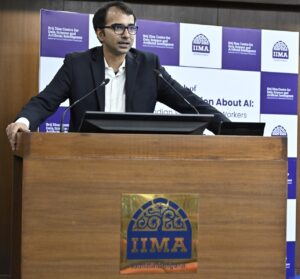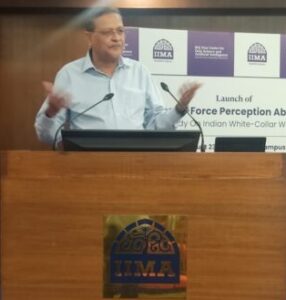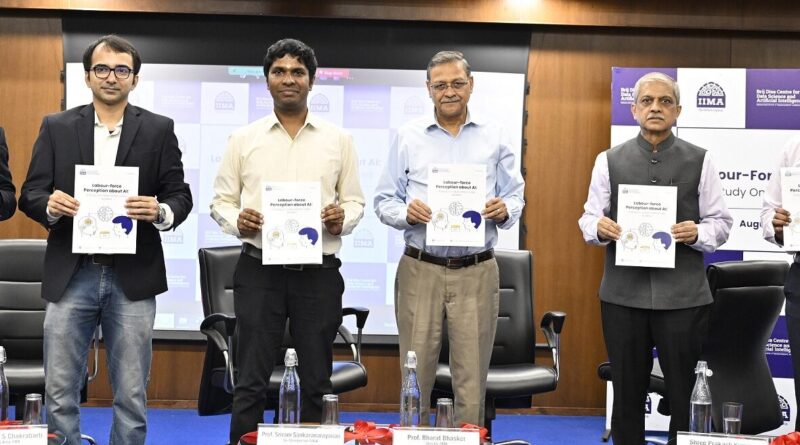IIMA Report Highlights Employee Readiness for AI, Calls for Upskilling and Education
The Report Reveals Growing AI Adoption Among White-Collar Workers, Urges Focus on Upskilling
BILKULONLINE
Ahmedabad, Aug 23: The Brij Disa Centre for Data Science and Artificial Intelligence (CDSA) at the Indian Institute of Management Ahmedabad (IIMA), in collaboration with the Wadhwani Foundation, has released a comprehensive report on the impact of Artificial Intelligence (AI) on India’s white-collar workforce. Titled “Labour-force Perception about AI – A Study on Indian White-collar Workers,” the report provides deep insights into AI awareness, usage, and the future outlook among employees, calling attention to the urgent need for upskilling and education.
Key Insights from the Report:
The report highlights that AI is no longer a distant possibility; it is already making significant inroads into the Indian workplace. Key findings include:
AI Integration: More than half (55%) of the surveyed employees reported using AI tools at their workplaces. Among them, 48% received formal training from their organizations, indicating a growing recognition of AI’s role in business operations.

Performance Enhancement: A majority of respondents (72%) acknowledged that AI tools significantly boost their work performance. Additionally, 59% of employees believe that AI complements their existing job functions rather than replacing them.
Job Automation Concerns: The report also addresses the looming threat of automation, with 68% of employees expecting AI to partially or fully automate their jobs within the next five years. Furthermore, 40% are concerned that their current skill sets might become obsolete.
Optimism About Job Creation: Despite concerns, 53% of respondents are optimistic about AI creating new job opportunities, emphasizing the need for strategic workforce planning.
Educational Gaps: A critical finding of the report is the gap in AI education, particularly among recent graduates and entry-level workers with less than five years of experience. This gap highlights the need for enhanced training and upskilling programs to better prepare the workforce for the AI era.

Industry Disparities: The report also sheds light on uneven AI adoption across different sectors. While industries such as IT, manufacturing, healthcare, and education are actively engaging in AI training, sectors like retail, trade, and infrastructure lag behind. Notably, the finance and insurance sectors, despite their reliance on data, are not leading in AI training, which may reflect higher expectations from these industries.
Speaking at the report’s launch on Friday, Professor Bharat Bhasker, Director of IIMA, emphasized the transformative potential of AI: “We must accept the fact that AI, ML, AR-VR, and other cutting-edge technologies have transitioned from being mere elements of science fiction to becoming integral parts of our present reality. The AI age is upon us, and its influence is growing significantly within the workforce and across various industries.”

He further added, “Businesses and employees are realizing the potential for enhanced efficiency and innovation through AI technologies. This report is very timely as it provides critical insights into the growing awareness and adoption of AI by employees and businesses for long-term success.”
Professor Anindya Chakrabarti, a faculty member in the Economics Area of IIMA and the lead Principal Investigator of the study, highlighted AI’s strategic importance: “AI is a strategic imperative for India, critical for maintaining and enhancing its economic competitiveness. In the face of global concerns about the negative effects of AI on employment, the Indian corporate sector and policymakers must understand how AI can sustain and complement employment rather than substituting it.”
He also remarked on India’s position in the AI landscape: “With a strong talent pool, a vibrant startup ecosystem, and a data-rich environment, India is well-positioned to capitalize on AI advancements. The study shows that the white-collar workforce is embracing AI tools, and that is a good thing. Business leaders and policymakers should recognize the high adoption rate as a pivotal moment in India’s pursuit of AI advancement.”
The report calls for a national-level coordination to build strong collaborations among academia, industry, and government to spearhead efforts in AI education and workforce development. The study’s findings, based on interviews with 31 business executives, a field survey of over 550 employees, and an analysis of over 70,000 job vacancies, provide a robust foundation for informed policymaking and strategic planning.
As AI continues to reshape the workforce, the insights from this report are invaluable for ensuring that India’s white-collar employees are well-equipped to thrive in an increasingly automated world. The report underscores the need for immediate action in upskilling and education to bridge the existing gaps and secure a competitive edge in the global AI landscape.
This more elaborate report includes detailed findings, expert quotes, and a call to action, offering a comprehensive view of the IIMA report’s implications.



